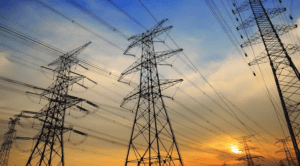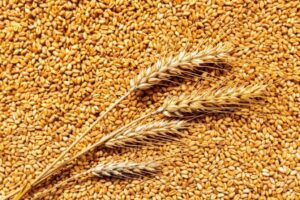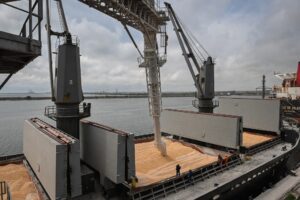
The export potential of Ukrainian wheat in the 2022/2023 marketing year (MY, July-June) may be about 12 million tons, which is 36% lower than in the previous 2021/2022 MY (18.7 million tons) and by 28% less than the year before last 2020/2021 MY (16.6 million tons).
As reported on the APK-Inform agency website on Friday, the decline in wheat exports is due to a 39% decrease in the expected gross grain harvest in Ukraine in 2022/23 MY compared to the previous season – to 52.3 million tons from 86 million tons, as well as the limited capacity of the country’s export infrastructure.
According to him, Egypt and Indonesia have been the key importers of Ukrainian grain products for several seasons: at the end of 2021/2022 MY, their shares in total exports amounted to 16% and 14%, respectively (2.9 million tons and 2.5 million tons in natural expression). It is specified that in 2021/2022 MY, Egypt increased purchases of Ukrainian wheat in relation to the season 2020/2021 MY by 19%, and Indonesia – by 2%.
Turkey became the third largest importer of Ukrainian wheat in the past MY – its imports more than doubled compared to the previous season – from 794 thousand tons to 1.9 million tons, and its share in total exports increased from 5% to 10%.
As reported, the US Department of Agriculture (USDA) in the July report predicts the harvest of Ukrainian wheat in the 2022/2023 marketing year (MY, July-June) at the level of 19.5 million tons, its export – 10 million tons, domestic consumption within the country – 10, 2 million tons. The corn harvest is estimated at 25 million tons, export – 9 million tons, domestic consumption – 10.7 million tons.

The European Union will be able to double the export of Ukrainian electricity this week, European Energy Commissioner Kadri Simson said at a press conference in Brussels on Tuesday after an informal meeting of EU energy ministers with their Ukrainian counterpart Herman Galushchenko on the sidelines extraordinary meeting of the EU Energy Council.
“If commercial electricity trading helps Ukraine offset some of the revenue losses, then this is the way forward. We are not waiting for any specific technical conditions to start trading. Trading is already underway,” she stated.
The European Commissioner recalled that the Ukrainian and Moldovan power transmission networks “were synchronized with the European one in record time.”
“I will continue to support the next step of a full-fledged electricity trade with Ukraine. The first commercial cross-border electricity exchange began at the end of June with Romania, and with Slovakia in July. At the moment, the trading capacity is 1,500 megawatts. But European transmission network operators meet on this week and will discuss doubling this amount,” Simson said.
In this regard, the European Commissioner opined that “by doing so, we will also be able to compensate for some of the production of capacities that here in the EU must be produced with gas, most likely gas from Russia.”
“These are mutually beneficial actions. But our cooperation in the future is not only electricity and gas, but you can expect that soon we will be ready to announce future cooperation in the field of clean gases, renewable gases. This is a market that will develop in Europe, and Ukraine has great opportunities to become our trading partner in the coming years,” she explained.
Simson also said that the EU-Ukraine High Level Energy Market Integration Panel will resume work in September, “accelerating the necessary reforms.” “This will be even more important, since Ukraine now has the status of an EU candidate with a clear European perspective,” the European Commissioner said.
In addition, she noted that Ukraine has the largest gas storage facilities in Europe. “And it’s in our joint interest to use them for security purposes,” Simson said.
For his part, Minister of Energy of Ukraine German Galushchenko noted that Ukraine has the ability to store more than 12 billion gas for European companies in its underground gas storage facilities “in fairly safe places.”
Galushchenko stressed that the Ukrainian gas transportation system could guarantee gas supplies at the level of those volumes that are transported to Europe through Nord Stream 1, “if the Russians close it.”
“Even during the war, we ensured the security of supplies of those volumes that go through the Ukrainian pipeline, and this was our obligation to our European partners. We are fulfilling this obligation,” the Minister of Energy stressed.
As for the export of Ukrainian electricity, according to him, today it is a direct replacement for Russian gas.
“Today we export 100 MW to Europe. But technically we could already increase it to 1.5-1.7 thousand MW, realizing that this can replace up to five to six billion cubic meters of Russian gas with Ukrainian electricity,” he said.
In addition, Galushchenko focused on the behavior of the Russian invaders at the site of the Zaporozhye nuclear power plant.
“What they are doing there is called nuclear terrorism. And therefore, we must be aware that in the 21st century, only one country can behave like a terrorist. And this is a matter of nuclear security. This is not only a matter between Ukraine and Russia, this is a question of the whole world,” the head of the Ministry of Energy stressed.

In the first 27 days of exporting electricity to the EU, NPC Ukrenergo earned over UAH 500 million from the sale of access to interstate power lines at cross-border sections with Romania and Slovakia, the company’s press service reported on Monday.
“This is the result of high competition at auctions for access to interstate power grids, which Ukrenergo conducts according to transparent European rules. From six to 13 participants participated in each of the auctions,” the report says.
It clarifies that in the direction of Romania there were ten or more companies in most auctions, and more than six in the direction of Slovakia, while in total more than 200 participants have already registered for participation in the auctions.
The company notes that the export of electricity to the EU countries allows the state and electricity producers to earn funds to prepare for the heating season: buy coal, finance repairs of power units of power plants and grids. In particular, at present, the company sells at auctions all available transmission capacity with Romania and Slovakia – 100 MW, which is in demand, since the price of electricity in the EU exceeds the Ukrainian one by several times.
The company’s income from access to interstate grids during the war can be used to settle the balancing market to give electricity producers an additional resource to prepare for winter. To this end, amendments to the law on the electricity market are expected.
According to Ukrenergo, the weighted average daily price of access to sections with Romania and Slovakia amounted to UAH 7,700 per MW over 24 days. At the same time, the highest weighted average price was at auctions for the delivery day on July 26 – UAH 14,600 per MW. At the same time, in previous years, such a record did not exceed UAH 3,000/MW.

The Joint Coordination Center in Istanbul for maritime exports of agricultural products from Ukraine continues to work intensively, as it is necessary to send the first ships with Ukrainian grain to customers as soon as possible.
This was announced by Turkish Defense Minister Hulusi Akar during a meeting with Minister of Infrastructure of Ukraine Oleksandr Kubrakov, according to the website of the Turkish Ministry of Defense.
During the meeting, Akar said Turkey is fulfilling and will continue to fulfill its part of the obligations as part of the shipment of goods from the seaports of Ukraine.
According to the Turkish department, its head expressed satisfaction with the news about the possible start of grain exports from Ukraine this week.

The export of Ukrainian grain will be launched primarily from Chornomorsk commercial sea port (Odesa region).
“We believe that within the next 24 hours we will be ready to work on resuming the export of agricultural products from our ports. We are talking about the port of Chornomorsk, it will be the first. Then there will be the port of Odesa and the port of Pivdenny,” the Deputy Minister of Infrastructure Ukraine Yuriy Vaskov said during a briefing in Kyiv on Monday.
According to him, within two weeks the Infrastructure Ministry will be technically ready to export from all terminals of the three seaports of the country.
The first shipment of grain, according to Vaskov, is expected this week.